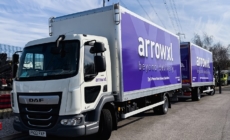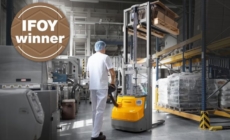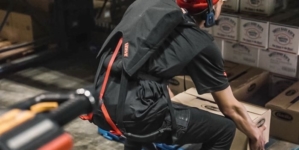-
ROSSLARE EUROPORT TARGETS HEALTH & SAFETY WITH CAMERA TELEMATICS PARTNERSHIP - 2 days ago
-
Landmark Study Reveals Wearable Robotics Significantly Boost Safety and Efficiency in Industrial Environments - July 24, 2024
-
Visku Tackle The Retail Seasonality Challenge One Pallet At A Time - July 22, 2024
-
KAMMAC AND BERGEN LOGISTICS STRENGTHEN FASHION & LIFESTYLE SERVICES IN THE UK - July 19, 2024
-
TENTBOX EXTENDS PARTNERSHIP WITH ARROWXL TO SUPPORT INCREASING DEMAND - July 17, 2024
-
The Perfume Shop improves customer journeys while driving profitability in partnership with Scurri - July 17, 2024
-
ZEROMISSION SECURES £2.3M ($3M) INVESTMENT TO ACCELERATE ELECTRIC FLEETS - July 16, 2024
-
BCMPA CELEBRATES SUCCESS OF 2024 CONFERENCE - July 15, 2024
-
Best of the Best: Jungheinrich Celebrates Triple International Award Win - July 12, 2024
-
GOPLASTICPALLETS.COM CALLS ON NEW CHANCELLOR RACHEL REEVES TO CONSIDER PLASTIC PACKAGING TAX REFORM - July 10, 2024
Gartner Announces Rankings of the 2017 Supply Chain Top 15 for Europe.
Three Companies Join for the First Time. Unilever Retains Top Spot in Rankings as Inditex Takes Second Place
Winners Revealed at the Gartner Supply Chain Executive Conference in London
Egham, UK, 21st September, 2017 — Gartner, Inc. has released the findings from its annual European Supply Chain Top 15, identifying supply chain leaders and highlighting their best practices. Analysts announced the results at the Gartner Supply Chain Executive Conference, which is being held this week at the O2 InterContinental Hotel in London, UK.
“Europe-based supply chains built on their strong performance in 2017,” said Stan Aronow, research vice president at Gartner. “Ten European firms made it into the global top 25, one more than 2016 and five more than 2015.”
In the European top 15, Unilever, Inditex and H&M took the top three spots, in that order (see Table 1.) There were three new entrants this year: No. 13 Adidas, No. 14 Roche and No. 15 Siemens. They replaced three companies exiting since the 2016 ranking: No. 13 British American Tobacco, No. 14 Ahold Delhaize and No. 15 Bayer.
“The companies in the European top 15 demonstrated strong growth of 6.8 per cent, which is more than double the average growth of the global top 25,” said Mr Aronow. “Moreover, European companies scored above average in corporate social responsibility and opinion score performance.”
Table 1. Gartner’s European Supply Chain Top 15 for 2017
|
2017 Europe Rank |
2017 Overall Rank |
Company |
Return on Assets1 |
Inventory Turns2 |
Revenue Growth3 |
CSR Component Score4 |
Composite Score5 |
|
1 |
1 |
Unilever |
10.2% |
6.8 |
1.9% |
10.00 |
6.39 |
|
2 |
3 |
Inditex |
16.3% |
3.7 |
12.0% |
10.00 |
4.98 |
|
3 |
5 |
H&M |
22.0% |
3.0 |
12.5% |
10.00 |
4.63 |
|
4 |
7 |
Nestlé |
7.9% |
5.1 |
-0.6% |
10.00 |
4.10 |
|
5 |
15 |
Nokia |
5.8% |
5.6 |
46.3% |
10.00 |
3.32 |
|
6 |
16 |
BASF |
6.1% |
4.0 |
-10.6% |
10.00 |
3.21 |
|
7 |
17 |
Schneider Electric |
4.2% |
5.1 |
-0.3% |
10.00 |
3.15 |
|
8 |
20 |
L’Oréal |
10.4% |
2.8 |
5.1% |
5.00 |
2.72 |
|
9 |
22 |
BMW |
3.7% |
4.1 |
6.6% |
10.00 |
2.62 |
|
10 |
23 |
Diageo |
8.9% |
0.9 |
-1.7% |
7.00 |
2.57 |
|
11 |
28 |
Reckitt Benckiser |
12.7% |
5.1 |
4.9% |
9.00 |
2.36 |
|
12 |
29 |
GlaxoSmithKline |
7.0% |
1.7 |
6.8% |
8.00 |
2.26 |
|
13 |
35 |
Adidas |
5.6% |
3.0 |
12.4% |
6.00 |
2.08 |
|
14 |
36 |
Roche |
12.4% |
1.9 |
3.1% |
9.00 |
2.05 |
|
15 |
38 |
Siemens |
5.1% |
3.0 |
3.9% |
10.00 |
2.03 |
Notes:
1. ROA: ((2016 net income/2016 total assets) * 50%) + ((2015 net income/2015 total assets) * 30%) + ((2014 net
income/2014 total assets) * 20%).
2. Inventory Turns: 2016 cost of goods sold/2016 quarterly average inventory.
3. Revenue Growth: ((change in revenue 2016-2015) * 50%) + ((change in revenue 2015-2014) * 30%) + ((change in revenue 2014-2013) * 20%).
4. CSR Component Score: Index of third-party corporate social responsibility measures of commitment, transparency and performance.
5. Composite Score: (Peer Opinion * 25%) + (Gartner Research Opinion * 25%) + (ROA * 20%) + (Inventory Turns * 10%) + (Revenue Growth * 10%) + (CSR Component Score * 10%).
2016 data used where available. Where unavailable, latest available full-year data used. All raw data normalised to a 10-point scale prior to composite calculation. “Ranks” for tied composite scores are determined using next decimal point comparison.
Source: Gartner (September 2017)
In line with the Global Supply Chain Top 25, the top trends that emerged across leading European supply chains were digital experimentation, speed to adaptability and a focus on sustainability.
“The bedrock of these successful trends are core foundational themes — common to all leading supply chain organisations — that have created a culture of excellence and relentless drive to continuously improve,” said Mr Aronow.
These common themes include:
Global scale, local responsiveness — Regardless of industry, these companies all have hundreds of sites, thousands of suppliers, thousands of SKUs and operate in dozens of countries. They set aggressive global targets, but allow flexibility in how they are achieved in local markets. Most have a few critical global-enabling processes around strategy, quality, planning, analytics, visibility and technology, and a combination of global and local manufacturing and distribution.
Multiple models through segmentation — Whether to address new product categories, emerging markets, the shift to multichannel or enhanced customer service, leaders apply segmentation to create a portfolio of standard models to meet different end-user needs and handle complexity effectively and efficiently. This allows them to be both cost efficient and leaders in customer service.
Collaboration — Based on visibility enabled by technology, these companies work collaboratively across whatever network is required to achieve the goal. Internally, that translates to a focus on making sales and operations planning a true decision-making forum across functions within the supply chain, with internal business partners, suppliers and customers. More broadly, leaders also focus efforts on strategic suppliers and partner with customers, competitors, governments and interest groups, as required.
Investors in talent and technology — High-performing supply chain operations widely acknowledge that technology facilitates execution. What these companies also recognise is that talented individuals create, drive and develop world-class supply chains. Many of these supply chains focus considerable effort on university relationships to hire great talent and take advantage of rotational programmes to develop the leaders of the future.
Culture of excellence and masters of change — For these companies, transformation is not a one-time project; it is a way of life. In addition to strong lean Six Sigma continuous improvement, and quality and standardisation initiatives that maintain a focus on operational excellence, they have dedicated resources to dream, pilot and drive disruptive change across the organisation. They are truly bimodal in how they create and improve capabilities.

































